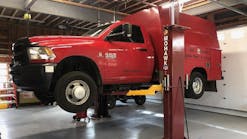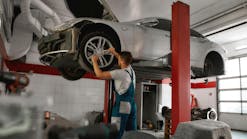For the second consecutive year, Toyota Motor Corp. won the recall crown, according to federal safety regulators.
The National Highway Traffic Safety Administration said Toyota recalled nearly 5.3 million vehicles last year. The Japanese automaker topped Chrysler Group, which came in second by calling back almost 4.7 million vehicles.
Overall, automakers recalled almost 22 million cars last year, the NHTSA said. That was 34 percent higher than the previous year and the most since 30.8 million vehicles were recalled in 2004, according to agency.
Toyota's recalls included an October call back of about 803,000 cars, including the Camry, Avalon and Venza, because of a problem that could inadvertently set off an airbag or shut down the power steering on the vehicles. It recalled an additional 780,000 RAV4 sport-utilities and Lexus HS250h hybrids to fix a suspension problem.
The automaker has a history of large recalls. It also called back 5.3 million cars in 2012 and was forced to recall millions more worldwide in recent years to address unintended acceleration and other problems.
Toyota spokesman John Hanson said one reason for the growing numbers of recalled vehicles is increased use of the same parts across several model lines.
"That is an industry trend," Hanson said. "We have had a couple of very large recalls because the component that was identified was common across several high-volume vehicles."
Chrysler's numbers included a recall of about 2.7 million Jeep sport utility vehicles for potential fire risks when they are rear-ended.
Honda Motor Co. posted the third-most recalls, totaling 2.8 million autos.
The NHTSA cautioned that the numbers don't factor in how many cars an automaker might sell in the U.S. annually, so the largest manufacturers tend to top the list each year. The agency also said its report is not an analysis on the overall quality of a particular car company.
Toyota and Honda models, for example, tend to top the recommended ratings in magazines such as Consumer Reports.
Recalls tend to vary by automaker based on how quickly a company might push new technology into its fleet, its tolerance of risk compared with other manufacturers and other factors, the NHTSA said.
"Recalls are not necessarily a bad thing. They can represent a manufacturer that is proactive about addressing a vehicle issue," said Karl Brauer, an analyst with auto information company Kelley Blue Book.
Consumer-oriented ratings don't just look at the design or functionality of a car, but also consider an owner's experience, Brauer said.
"If there is a problem and it is not addressed after you purchase a car, you are going to be less happy than with a company that addresses the problem," he said.
In the NHTSA ranking, South Korean automaker Hyundai was fourth, with 2.3 million vehicles recalled, and Ford Motor Co. was fifth, with 1.2 million vehicles.
Kia, Hyundai's automotive sibling, was sixth with 1 million vehicles, Nissan ranked seventh with 958,148 vehicles, BMW was eighth at 934,047, General Motors ninth at 757,677, and Suzuki, which no longer sells cars in the U.S., was 10th with 405,605 cars recalled.
Subaru ranked 11th with 337,569 vehicles recalled. Mazda was next with 161,549 and Volkswagen ranked 13th with 70,706 vehicles recalled.
With the exception of Mercedes-Benz, companies that don't sell many cars in the U.S. recalled the fewest vehicles.
Mercedes recalled only 747 cars last year, according to the NHTSA, the best record of the major automakers.
Porsche had the second fewest recalls -- 2,551. Jaguar Land Rover recalled 6,841 cars, and Mitsubishi brought back 23,625. Volvo recalled 38,703 vehicles.

